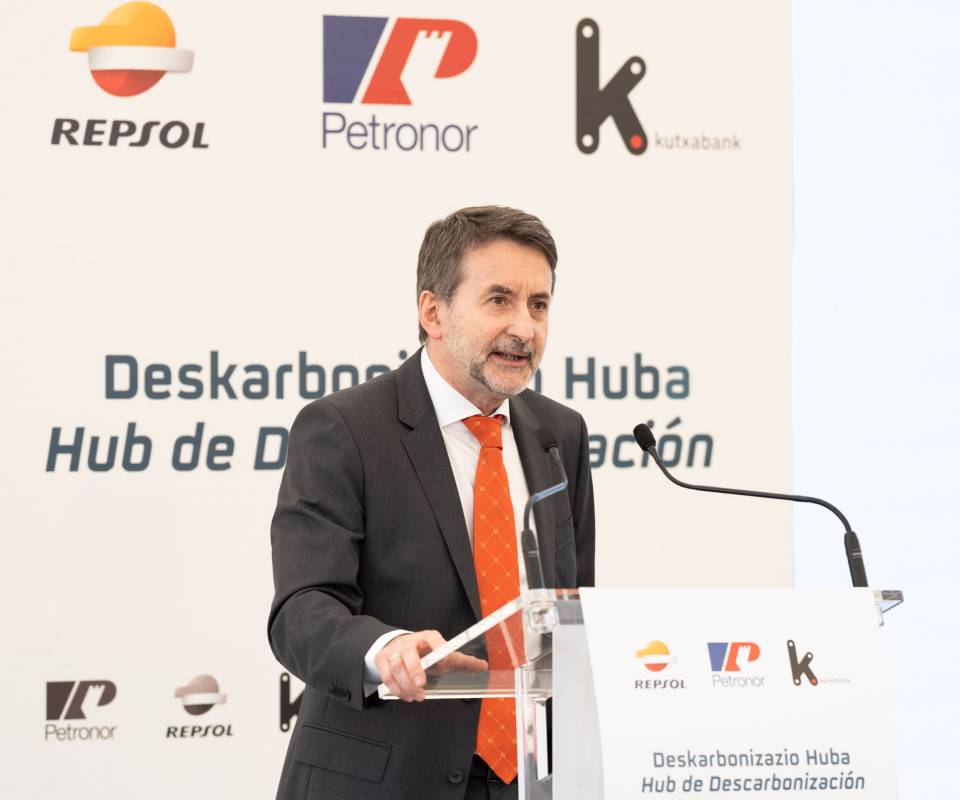
Josu Jon Imaz presents Repsol's progress on decarbonization projects in Bilbao
- The CEO of Repsol, Josu Jon Imaz, said that "our commitment to effective and sustainable decarbonization involves an initial investment of €103 million in new decarbonized industrial plants that will generate quality employment, industrial strength, and competitiveness."
- Emiliano Lopez Atxurra, Chairman of Petronor, announced the upcoming start of the construction work of both the synthetic fuels plant and the waste valorization project.
- The project will make use of cutting-edge technologies, key to reducing emissions from transport and waste recovery.

The Chairman of Petronor, Emiliano López Atxurra, today announced the upcoming construction work for the new Bilbao decarbonization hub that will be composed of a synthetic fuels plant and an urban waste processing project. At the event, he was accompanied by the President of the regional Basque Government, Iñigo Urkullu; the CEO of Repsol, Josu Jon Imaz; the Chairman of Kutxabank, Gregorio Villalabeitia; the Deputy General of the province of Bizkaia, Unai Rementeria; and the Minister for Economic Development, Sustainability and Environment of the regional government of the Basque Country, Arantxa Tapia.
Josu Jon Imaz, CEO of Repsol said that “the project will allow us to test the technologies that will be used together for the first time in the world here in Bilbao.”
Emiliano López Atxurra stated that "with this project we unite present, past, and future, because this port is part of Petronor's history and present. Now it is also part of the future. This is an example of the technological neutrality that we champion as a guide for a sustainable and inclusive energy transition.”
With the construction of these new plants, Repsol continues to advance in its commitment to decarbonization to achieve the goal of zero net emissions by 2050. The company's strategy is fully aligned with the objectives laid out by both the European Union and the Spanish Government. The Fit for 55 regulatory package, presented last year by the European Commission, supports the deployment of fuels with a low carbon footprint, produced either from waste or from non-biological sources, such as synthetic fuels, as is the case for these new plants presented by Imaz.
These are two major industrial projects that also demonstrate the importance of maintaining technological neutrality in the search for sustainable and complementary alternatives to achieve the decarbonization of the economy.
Synthetic fuels
Repsol’s main partner in the synthetic fuels plant is Saudi Aramco. It is one of the Spanish multi-energy company's reference projects within its industrial transformation strategy. The plant represents a cuttingedge technological challenge, as it is necessary to develop the technology to transform CO2 and hydrogen into synthetic fuels with the same properties as traditional commercial fuels.
The Repsol Technology Lab is working on the development of this new fuel with a team of scientists from both companies to develop the technological route. The process consists of several stages that are at different levels of maturity and need to be integrated and scaled up in order to be implemented in the demo plant. To achieve the objectives, Repsol and Saudi Aramco have also brought in the British company Johnson Matthey and the French company Axens as technology partners. The new technological solutions will be applied together for the first time at the synthetic fuels plant in Bilbao.
The project shows significant progress in the engineering phase, which is led by Repsol's engineering team. The construction phase will begin soon and is expected to last for two years. The plant will be one of the largest of its kind, and it represents an investment of €103 million. With an annual production of 2,100 tons, it will provide sustainable fuels for cars, trucks, ships, and airplanes without the need for engine modifications. It is therefore a real option for decarbonizing sectors such as aviation and heavy transport, where electrification is currently not an alternative.
To feed the plant, CO2 captured at the Petronor refinery will be used, and a 10 MW electrolyzer will be installed to produce hydrogen with renewable energy. This facility, promoted by Repsol, its partner Petronor, the regional Basque energy agency EVE, and Enagas, is one of the projects included in the Basque Hydrogen Corridor.
Circular economy to recover urban waste
The second decarbonization project is focused on the recovery of urban waste such as paper, cardboard, plastics, and fabrics. These materials, once their useful life is over, still contain energy that can be used to manufacture products needed by society, such as fuels with a low carbon footprint and other products for the petrochemical industry.
This gives a second life to waste that would otherwise end up in landfills, reducing its environmental footprint and contributing to the circular economy. The installation will transform this waste into oils or gases that will be used as a substitute for the raw materials that the Petronor Refinery normally uses in its processes, further reducing its environmental footprint.
For Repsol, the circular economy is a key lever in its industrial transformation program by making it possible to manufacture products with high added value and a lower carbon footprint from different types of waste. Repsol is analyzing more than 40 types of waste and technologies to ensure the production of advanced biofuels and circular petrochemical materials. Among other new plants that the company has already announced is the Ecoplanta, which will be located in Tarragona with an annual production of 240,000 tons of methanol for use in biofuels and circular materials